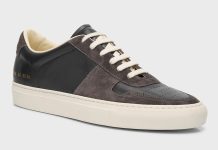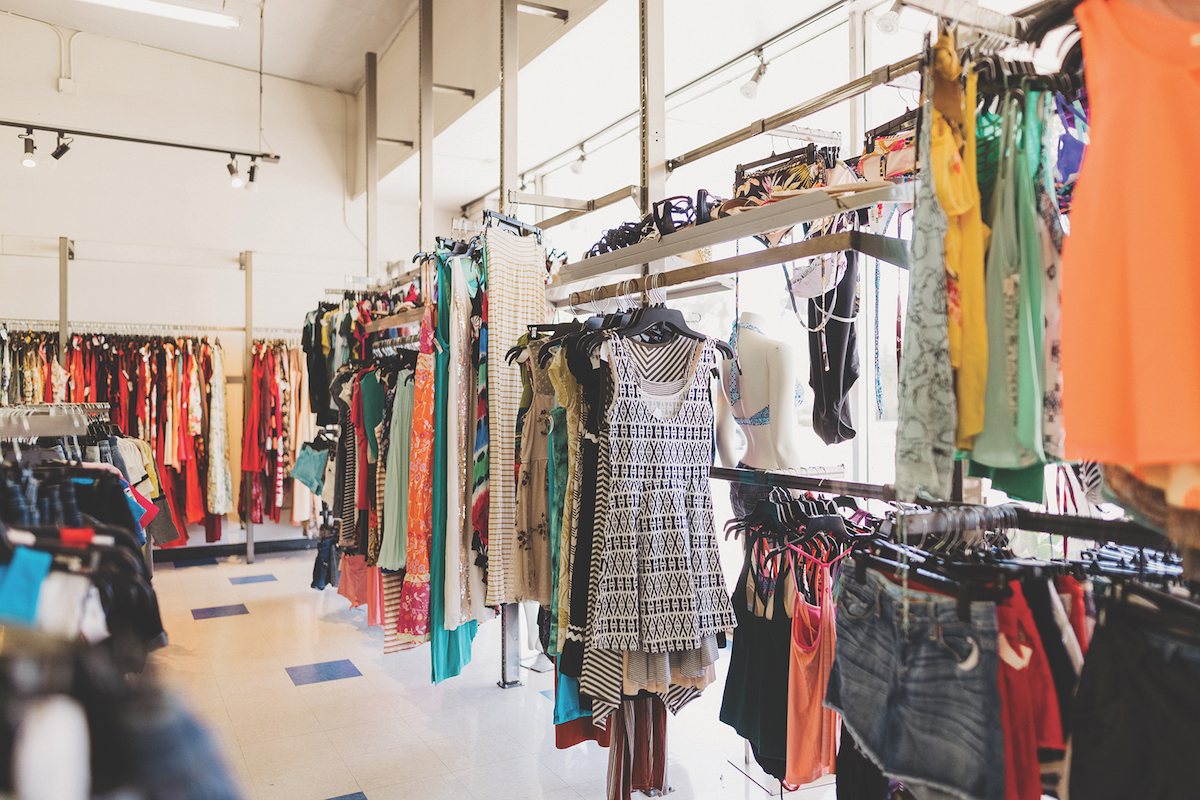
Newport Beach’s secondhand stores combat unsustainable fashion, deterring items from ending up in landfills, while providing an assortment of notable styles.
By Izzy De Leon
Walking into The RealReal, a spacious shop at Lido Marina Village, distinct sections offer an array of men’s and women’s clothing, fine jewelry, watches, handbags, shoes and accessories. To help shoppers navigate the hundreds of pieces available for purchase, ready-to-wear racks styled by season and fashion trend line the walls: Weekend Getaway, Quiet Luxury, Vintage Now, Outer Layers, and Chanel, Dior & More. A consignment desk for drop-offs as well as offices for fine jewelry and handbag valuations also enhance the experience.
The RealReal is just one of several high-end consignment and thrift stores found in Newport Beach. The secondhand nature of these stores helps to encourage sustainability, especially as the fashion industry contributes to pollution and so many fast-fashion pieces end up in landfills because these low-quality garments wear out quickly and the trends they represent are fleeting.
According to Action for the Climate Emergency, an organization that’s passionate about fighting climate change and inspiring youth, fashion manufacturing accounts for the annual release of approximately 1.2 billion tons of carbon dioxide into the atmosphere. Other studies have found textile production creates an estimated 42 million tons of plastic waste globally per year including some microplastics that make their way into oceans and waterways.
As more people choose used clothing—not only for the vintage and unique style options, but also for the eco-friendly factor—consumer demand slowly begins to make an impact on the industry and spur changes.
“There is no doubt that the rise in secondhand shopping has encouraged retailers to pay attention to the life cycle of their brand,” says Sarah Davis, president and founder of Fashionphile, which has a selling studio in Neiman Marcus at Fashion Island.
The Art of Consigning
When it comes to treasure hunting for pre-owned fashions, Newport Beach is the perfect place to start. Boasting numerous secondhand stores, shoppers can find items that no one else will have.
Some long-standing resale designer stores in Corona del Mar include Recycled Rags, OnQueStyle and Bellissima Consignment Boutique. Opened in 1969, Recycled Rags utilizes in-house stylists to help personalize the shopping experience for its customers. Featuring designers such as Chanel, Louis Vuitton, Valentino, Brioni and more, the store sells a plethora of high-end items.
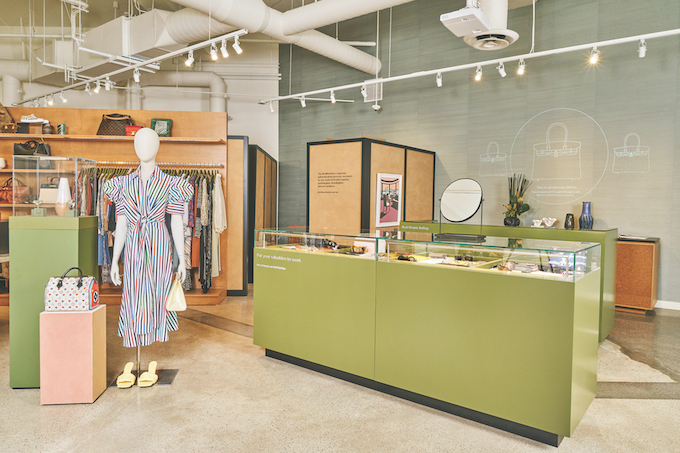
OnQueStyle has a wide range of clothes, shoes and accessories, plus a sale section with reasonably priced upscale items just waiting to be bought. Recent finds include a Chanel quilted lambskin bag and Christian Dior sneakers. Bellissima Consignment Boutique, which has been open for more than 20 years, sells designer items from brands like Alexander McQueen, Burberry and Hermes. Styles for every occasion and hidden gems—like a limited edition Chanel Cruise nautical quilted crossbody purse in orange lambskin—have been discovered at Bellissima.
Newer to the local scene, The RealReal—which is one of the largest sustainability-focused designer consignment companies—opened its Lido Marina Village shop in 2021, adding to its roster of more than a dozen retail locations across the U.S. Founded in 2011 by Julie Wainwright, The RealReal focuses on encouraging a circular economy in terms of clothes, handbags and fine jewelry.
“Sometimes when people want to be sustainable, they don’t know where to start,” says Newport Beach store manager Chelsea Bennett-Johnson, who has been involved in the fashion industry for 17 years. “Resale is a way for customers to pay it forward. If they no longer wear an item, they can put the item back in rotation, keeping it out of landfill and giving shoppers an opportunity to … [buy] resale instead of in the primary market. The product[s] we sell … [are] phenomenal, and we have access to this incredible inventory because of our consignors.”
Secondhand stores also help to “spark the conversation about resale and educate consumers,” Bennett-Johnson adds. Combining fashion, sustainability and luxury, The RealReal serves a purpose for its community. And the Newport location’s high level of foot traffic is bolstered by word-of-mouth recommendations that help introduce people to this approach to shopping.
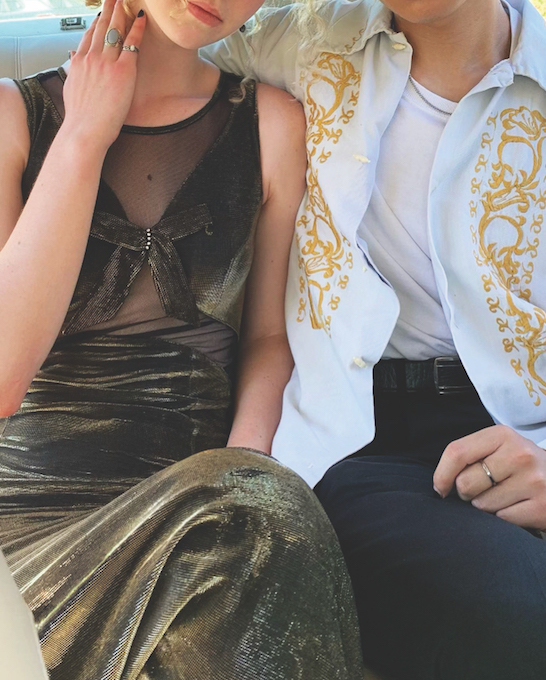
The product authentication process is integral to The RealReal’s success. Using both technology and experts to ensure that items are not knock-off pieces, customers are given multiple ways to engage in selling and buying.
The RealReal notes a rise in customers over the past few years to more than 34 million members in early 2024. Its consignment stores strive to keep luxury and unique pieces in circulation and out of landfills. At the same time, they aim to maintain original craftsmanship and sell items at a reasonable price, especially when it comes to difficult-to-find vintage and rare items.
“[Fashion] … is an art of expression. But sometimes, you can’t take it too seriously. … I wear a uniform every day, so I look for simple ways, like jewelry and accessories, to still reflect my personal sense of style,” Bennett-Johnson says, adding that resale lets people curate and have fun with fashion.
The RealReal’s Lido location receives daily arrivals of new items and has numerous options, such as Hermes Kelly and Birkin bags, Oscar De La Renta and Zimmerman midi dresses, discontinued Louis Vuitton Epi Lussac bags, Christian Siriano tops, Cinc A Sept blazers, vintage Burberry check totes, Versace denim jackets, Ralph Lauren mini dresses and Marc by Marc Jacobs leather crossbody bags.
The Hunt for a Good Find
Swellegant Vintage is another local resale store, curating mostly 1950s- to 1990s-style clothes. Founder and owner Nicole Bernstein hopes to “make sure [the shop’s] items stay out of landfills and stay alive” by making their way into other people’s wardrobes.
Since its opening in 1997, the mission of Swellegant has been to preserve history while being environmentally minded. Finding her items at antique flea markets, estate sales and, most notably, from years of connections, Bernstein hopes to slow the impact of fast-fashion companies—whose clothes often mimic vintage styles.
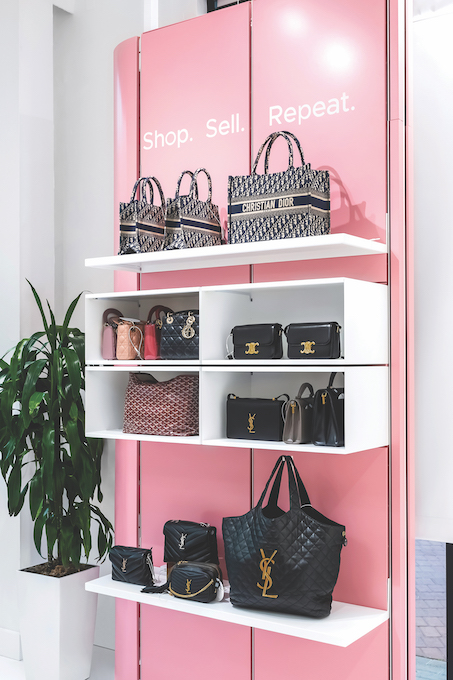
When it comes to sustainability, Bernstein believes it is part of our responsibility as human beings to make the most of our materials and respect the labor that goes into making garments—the best way being to recycle clothing. Swellegant aims to evoke the feelings of the past with the timeless style it carries, whether items are by high-end designers or not.
An Orange County native, Bernstein wants people to “see that they can create their style with things that are already out there,” as opposed to relying on fast fashion stores. “When people see a store like mine, I hope they stop and think about where these things come from and where they should come from,” Bernstein says.
Fashionphile, a resale store with a slightly different customer base, sells pre-owned handbags, accessories, fine jewelry, watches and shoes. Prizing secondhand items, Davis wanted to revolutionize luxury fashion while valuing the history, heritage and quality of designer brands. One of the largest online platforms for buying and selling ultra-luxury handbags and accessories, Davis and partner CEO and co-founder Ben Hemminger gained Neiman Marcus as their first investor in 2019, two decades after Fashionphile’s creation.
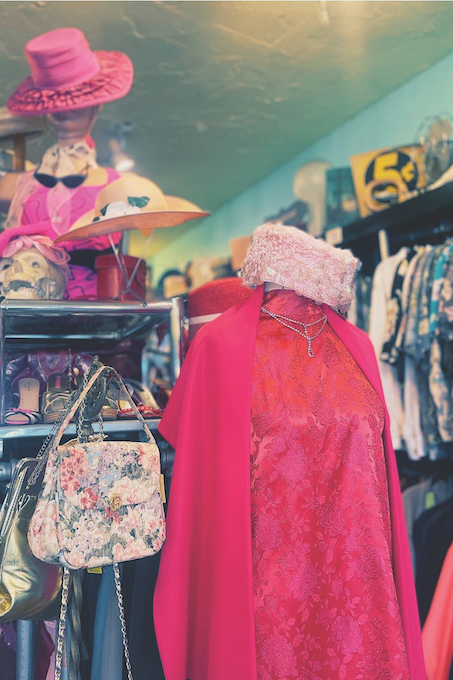
Loving “the hunt” to get a good deal, Davis says she has a passion for thrifting, and “the thrill of finding an item that got away or a one-of-a-kind piece.” As ultra-luxury accessories hold and maintain retail value better than some other fashion categories, they can be a good investment to bolster any closet and help dress up any outfit. Fashionphile curates items that will help set any shopper apart, like a matte alligator Birkin 35 Favue bag; Saint Laurent rubber studded Festival Rain Boots; Chanel metal, crystal and pearl 1990s Camellia CC drop earrings; or a Christian Dior Christal Quartz Watch with stainless steel, diamonds, sapphires and pink mother-of-pearl.
“[Fashionphile believes] … buying fewer quality items is better than buying a lot of cheaper, low-quality things, and resale helps more people to have access to even more high-quality pieces that will be around for decades, not years,” Davis says.
Charitable Charges
Adding on to environmental benefits, thrift shops run by nonprofit organizations offer the opportunity to give back to charities.
Nonprofit organizations with thrift and resale stores in and near Newport include the Mariners Church; The Salvation Army, whose proceeds fund its rehabilitation centers; and Assistance League of Newport-Mesa, which helps provide underserved children with new school uniforms and essentials, presents entertainment programs and offers scholarships.
The Discovery Shop, which has a store in Corona del Mar, is operated by the American Cancer Society. Selling pre-owned, high-quality men’s and women’s clothing, accessories, artwork, furniture, home decor and more, the Discovery Shop’s West Coast locations have raised more than $372 million since the first one opened in San Fernando in 1965. These funds go toward cancer research, providing lodging for patients while seeking treatment, rides to and from treatments, and boosting diversity among cancer researchers.
CdM Discovery Shop manager Alyce Rippee says the store receives many antiques and family heirlooms. “We recently had a bowl from Japan from the 1800s valued at $5,000 in sterling silver, and many porcelain pieces that are highly collectible,” she says. “[And] we have had art valued at $35,000; jewelry up to $5,000; handbags by Dior, Chanel, YSL [Yves Saint Laurent], Prada [and] Fendi—all major designers. We receive many specialty pieces.”
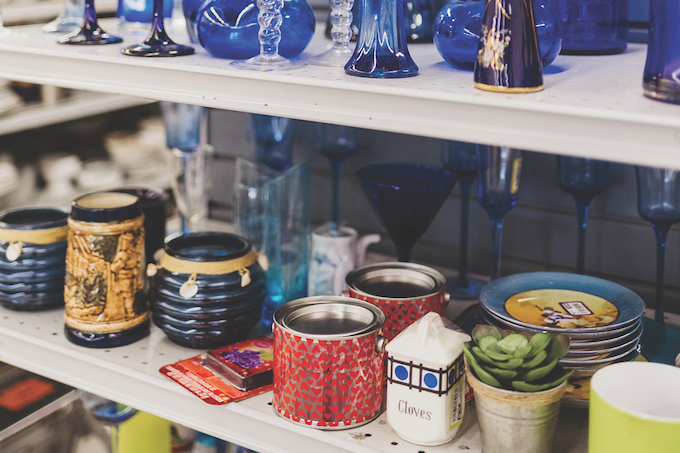
In January, she had five new wedding gowns, originally priced from $3,000 to $28,000, for sale at the shop for $150 to $2,500. “We are like no other thrift shop,” she says. “All of our donors are from this area and are very generous.”
Nonprofit Goodwill of Orange County is another big thrift store chain in the area, with a donation center in Newport and both a store and donation center in Costa Mesa. This zero-waste organization provides “the fuel for [its] … mission and a training ground for people on their pathway to career growth and opportunities,” says Victoria Tran, marketing and social media coordinator at OC Goodwill.
Founded in 1902 by the Rev. Edgar J. Helms in Boston, Goodwill Industries International opened an Orange County branch in 1924. “[We] encourage … people to shop secondhand and make environmentally conscious purchases,” Tran says. By giving items the second chance they deserve and diverting millions of pounds from ending up in OC landfills each year, the nonprofit also discourages excessive consumption and makes a difference for community members.
“We are able to provide consumers with a more affordable way of shopping for everyday items, minimize waste and lower carbon emissions. Not to mention, supporting people in the community with our life-changing programs and services funded by the sales made in our retail stores. We are proud to continue to pave the way for impact-driven secondhand shopping in OC,” Tran says.
OC Goodwill marketing manager Menna Eshete adds that, “People who shop at Goodwill of Orange County are helping community members … through services like one-on-one job coaching, career planning, work experience, introductions to top local employers and much more. … For every dollar spent at Goodwill thrift stores, 94 cents directly fund[s] our workforce development programs and services that help people in the community reach their fullest level of independence.”
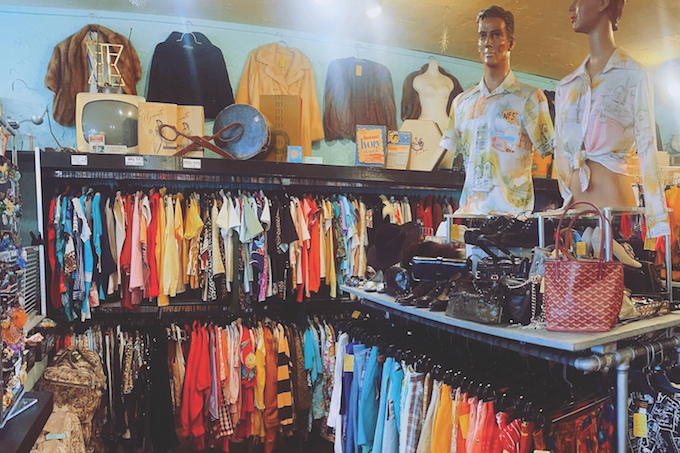
“Fashion can be a way to showcase individuality and a person’s values. OC Goodwill strives to create a greener planet and is a major advocate for sustainable fashion,” Tran says. “Shopping sustainably for clothes allows individuals to access a variety of clothing styles without contributing to the fast fashion industry’s negative impacts.”
Corrine Allen, chief operating officer of OC Goodwill, notes how the younger generations are “embracing the uniqueness of thrifting,” perhaps partly “due to the power of social media.”
Thrift store shopping is a great way to keep up with current trends from popular stores while saving money. For those looking to upcycle old pieces and configure distinctive and personal outfits, a thrift store that doubles as a charity can provide inspiring motivation at the same time.



